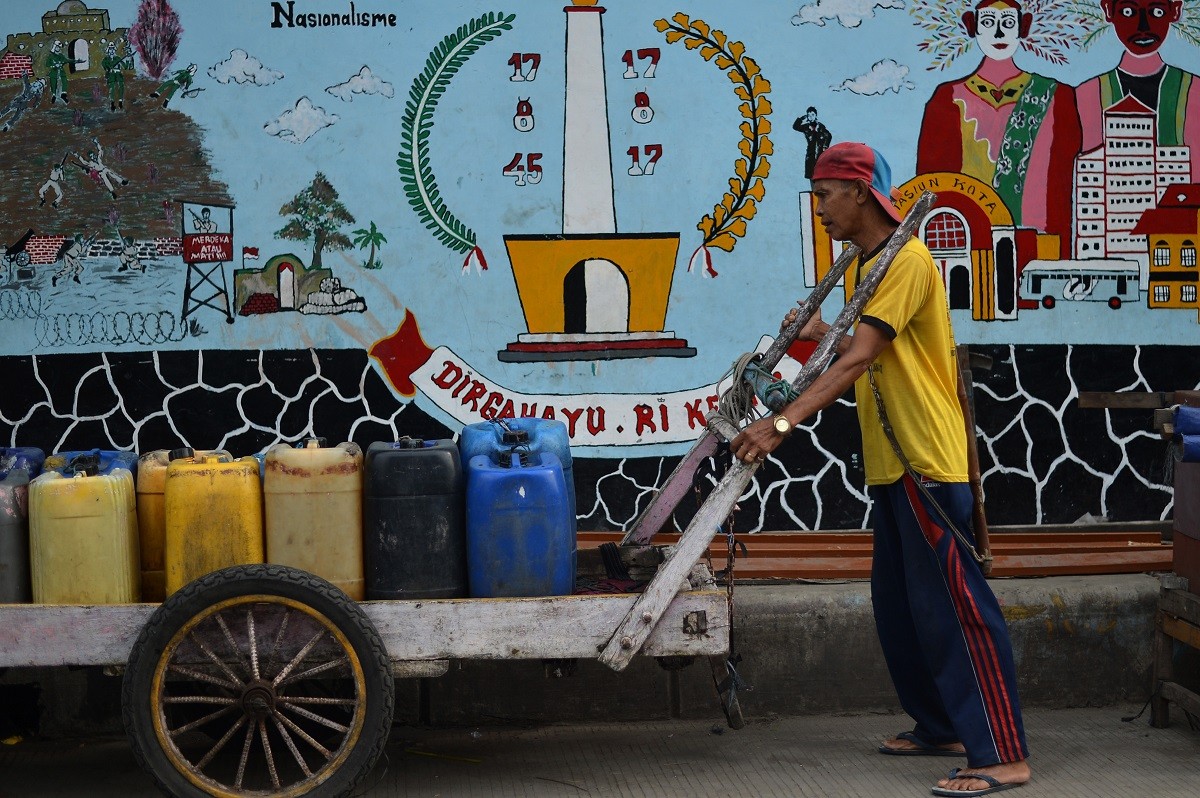Popular Reads
Top Results
Can't find what you're looking for?
View all search resultsPopular Reads
Top Results
Can't find what you're looking for?
View all search resultsJakarta’s remunicipalization plan raises hope for better water service
Activists and the city's residents are hoping the administration's remunicipalization plan will lead to better tap water services.
Change text size
Gift Premium Articles
to Anyone
E
llya, a resident of Cempaka Putih, Central Jakarta, pays Rp 300,000 (US$21.38) a month for a water service of less than 40 cubic meters used by six adults and two children.
She does not mind paying that much for such a basic need, but cannot help but compare it with the price her husband’s family pays in his hometown of Padang, West Sumatra, of less than Rp 150,000 a month for five adults.
As a long-time customer of Jakarta’s tap water service, she said the tap water ran slowly at least once a month. Although, she added that the quality of the water, supplied by the privately owned PT Aetra Air Jakarta, had improved in terms of its turbidity level and that the smell of chlorine had decreased each year.
The city administration recently announced a plan to retake control of the tap water service after being run by two private firms for the past two decades. This is part of a larger global trend toward remunicipalization, by which local authorities retake control of previously privatized water and sanitation services.
But Ellya said she did not care about such technicalities, she simply wanted clean water to continue to be supplied to her house. Although, she did express hope better services would be provided if city owned water company PAM Jaya took control.
“If PAM Jaya manages the tap water, hopefully, the price will be cheaper because I believe [PAM Jaya] will not be focused solely on profit,” the 59-year-old piano teacher told The Jakarta Post recently.
Read also: Jakarta to take over water management from Aetra, Palyja despite court decision
Jakarta Governor Anies Baswedan announced on Monday that his administration was planning to retake control of tap water management from private firms Aetra and PT PAM Lyonnaise Jaya (Palyja). The remunicipalization plan is part on the city’s efforts to achieve 82 percent tap water coverage by 2023. The realization of this target has been slow because of the previous agreement with the private operators. Tap water coverage today sits at 59.4 percent, a sluggish increase from 44.5 percent in 1998.
Activists and the public alike have long demanded remunicipalization. Although Jakarta’s plan is still underway, Badung regency in Bali has found success after ending its 20 year partnership with private firms in 2012, according to remunicipalization global tracker website remunicipalisation.org.
Tommy Albert Tobing, a member of the Coalition of Jakarta Residents Opposing Water Privatization (KMMSAJ), said direct remunicipalization would ensure the profits from the lucrative tap water business would be used for the good of the city’s residents, rather than for the benefit of a hand full of people.
“The profits from PAM Jaya will be for residents,” Tommy said.
He cited Aetra’s 2016 financial statement, which reported that the company had made Rp 400 billion in profit with its daily profit estimated to be Rp 1.09 billion, enough to cover 1,015,486 peoples’ monthly water bills.
Read also: Water for all in Jakarta
He said the plan would also return Rp 1.77 trillion in assets to the city administration that was currently in the hands of PAM Jaya’s private partners.
As the administration was still mulling its options for taking control of tap water management, Tommy recommended any option that allowed for minimum expense and maximum benefit.
Termination of the contract was the best way to ensure tap water management was returned to the people, he said, adding that other options could leave the door open to reprivatization.
Regarding compensation for the private firms, Tommy said the administration could possibly file a counterclaim, which would include wanprestasi(default) of contract regarding the water coverage target.
PAM Jaya, which has long served as a supervisor rather than an operator, was optimistic the 82 percent tap water coverage target could be achieved by 2023.
The company’s president director Priyatno Bambang Hernowo said on Tuesday that investment was the key to achieve the target, as the firm had to build more water treatment plants and expand the piping network. It would need more than Rp 8 trillion to bolster Jakarta’s distribution network, he said.
The funds could be gained from, among other sources, the city budget, commercial banks, or bonds. The city needed an additional 17,000 liters of water per second to fulfill complete coverage, from the existing 22,000, he said.
Indonesian Consumer Foundation (YLKI) researcher Sularsi said the city’s water supply had seen little improvement because of the slow pace of water pipe expansion and insufficient water leak reduction.
However, Sularsi also said the underlying problem was not only the tap water service itself, but the availability of water resources, highlighting Jatiluhur Reservoir, which supplies 81 percent of the city’s water.
“Water management problems cannot be solved by the Jakarta administration alone. It should be intersectoral, including the central and regional governments," she said.










